As a lifelong piano player and owner of a piano store, I’ve probably “quit” piano at least a dozen times over the years.
I’m certainly not alone – it’s incredibly common for piano students of all ages to go through periods of frustration, boredom, or scheduling conflicts that make them want to quit lessons. Pretty much everyone on our team has quit piano playing for one reason or another at some point.
Quitting formal piano lessons doesn’t have to be a dramatic event or a permanent goodbye. Sometimes, letting go of all of the expectations, the stress, the missed goals, the judgements of teachers, and everything else surrounding piano can be really liberating. Sometimes, just sitting down at a piano and spending the afternoon working on a fun new song you recently heard can be incredibly rewarding in its own right. If the structure surrounding your piano playing is destroying your desire to play piano, sometimes stepping outside of that structure and re-evaluating it is key to being able to enjoy the instrument and your own music.
With some reflection on your reasons, a plan for using your new free time, and an understanding that you can still enjoy music in other ways, I think that quitting piano in the short-term can allow you to have a healthier relationship with the piano in the long-term.
Reasons People Commonly Quit Piano
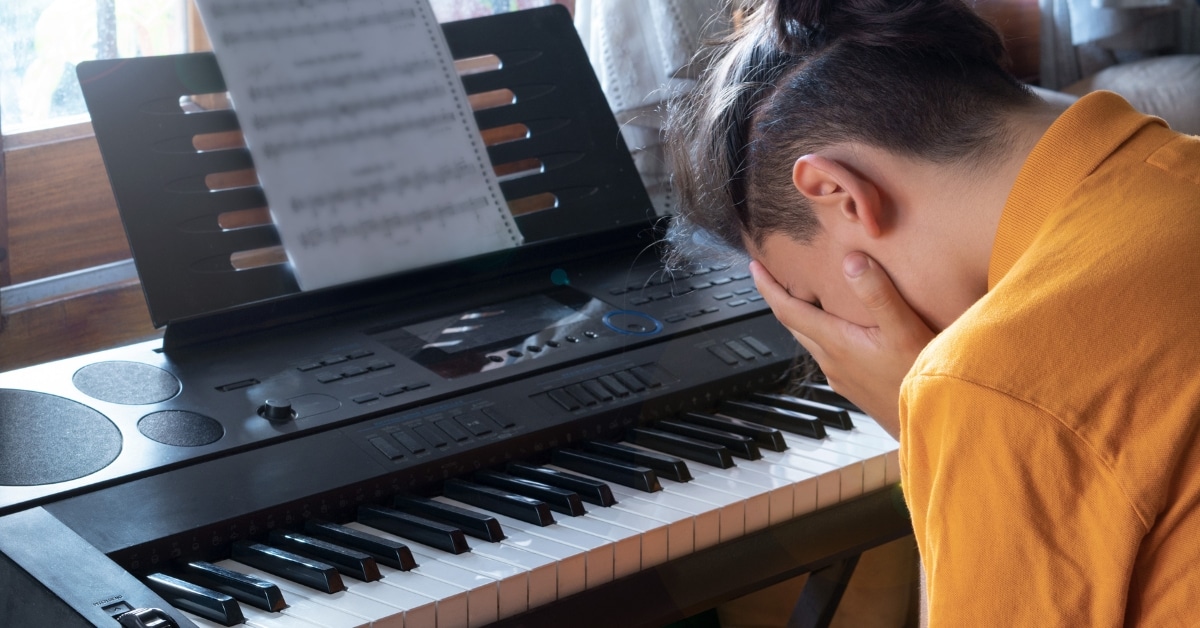
There are a variety of reasons people decide to stop taking piano lessons or playing as often. Some of the most common include:
- Loss of passion or fulfillment from playing
- Not enough time to practice with school, extracurriculars, work, or other hobbies
- Wanting to redirect practice time to other priorities
- Feeling stuck in a rut musically or lack of new challenges
- Musical interests shifting away from “classical” piano
- Not having a quality instrument (we can help with this!)
If you relate to one or more of these reasons, you’re not alone! Reflecting on what specifically is making piano less enjoyable or feasible for you can help inform your decision.
Factors to Consider Before Officially Quitting
If you feel like you want to quit, take some time and explore that feeling. Don’t just shove it down, but rather, give yourself a block of focused time to more deeply explore these feelings. Talk to a family member, close friend, or pull out your journal.
It’s important to try to resolve these issues, so they don’t fester into long-lasting feelings of resentment or feeling like you’re a failure. Because you’re not! There are many reasons why you might be seeing more or less progress right now.
Before calling it quits, spend some time seriously evaluating factors like:
- Your current level of passion and enjoyment of piano overall. Do you feel like you’re being forced to play more than you’d like? Not enough?
- The time commitment required versus the time you actually have to practice. Have you looked at your calendar? Perhaps try scheduling practice times at different times in your routine?
- Do you like the music that you’re playing? Anything you would like to play more?
- Do you like your piano teacher? What about the commute there? Which day of the week are your lessons? Have you considered online vs in-person?
- Do you like performing? Do you enjoy activities like open-mics, recitals, competitions, or jamming with friends? Maybe you want to participate, or maybe you prefer to just play solo piano in the comfort of your living room?
- Do you like your musical instrument? If it’s acoustic, do you need your piano tuned or worked on? Or perhaps you’re interested in exploring all the whizbang cool things that digitals can do? If you play a digital, do you yearn for a “real” piano?
- Is privacy a problem? Do you need a digital or hybrid with headphones? Would you prefer if your family members gave you more space during practice?
By exploring your current feelings and the situation, you can use that to troubleshoot your current approach to learning piano and maybe make some changes that will improve your relationship with the piano. Maybe you don’t have to quit, after all!
Downsides to Quitting Piano
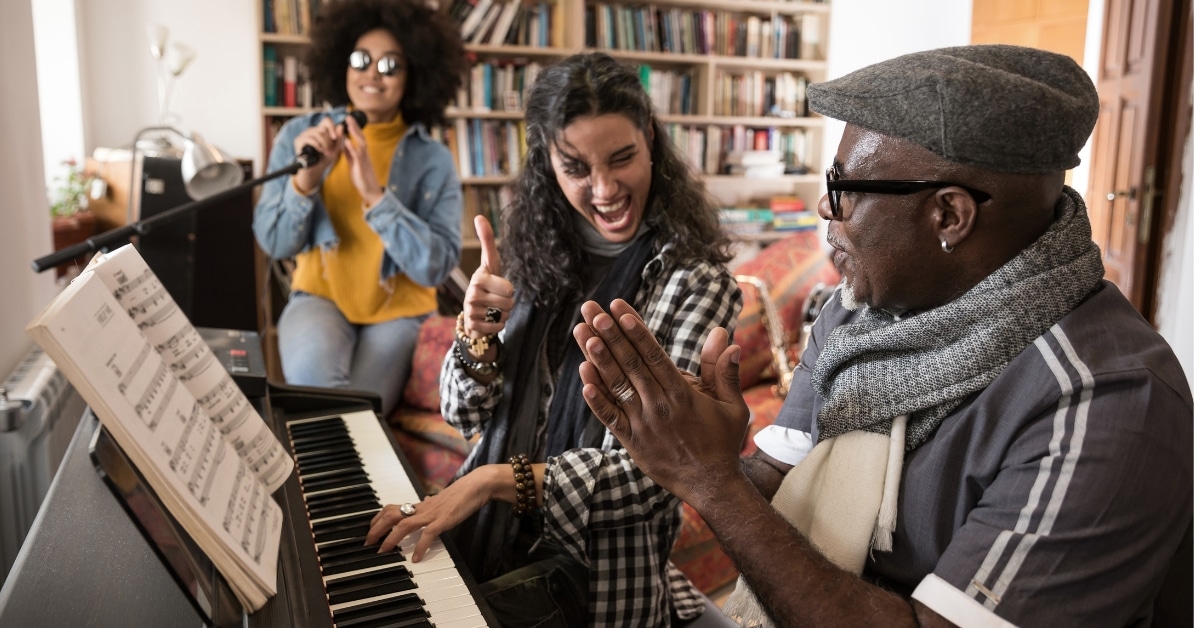
There's really nothing quite as gratifying as a good music session with friends. Getting to this point is a huge payoff — and missing out on it is a huge bummer!
Here at Family Piano Co, we’re obviously big fans of playing piano and there are a ton of advantages of playing piano. We don’t want to guilt you (since guilt might be one of the reasons why you feel like quitting), but we do want to highlight some of the downsides of quitting, while we’re considering it from all angles:
- Quitting piano could mean losing a creative outlet that provides mental stimulation. The practice of learning new pieces challenges your brain while playing can help reduce stress. If piano has been an important channel for self-expression, you may miss having that emotional release.
- Piano can help build discipline, perseverance, and focus. Quitting any hobby to free up more leisure time often ends up getting filled by passive activities like TV watching that bring less fulfillment. Be thoughtful about how you will spend time previously spent at the piano.
- Quitting also risks losing an enjoyable social activity if you play in a band, accompany choirs, or simply enjoy playing Christmas carols for the family every December.
- If you’ve invested significant time and money into piano lessons, an instrument, and music books, walking away can feel like losing value from those investments. (That said, one can still reap life-long benefits from learning music, even if you don’t continue actively studying for the rest of your life!)
- Once you get out of the habit of practicing and playing regularly, it can be difficult to rebuild stamina and technique if you later wish to return to piano. Taking a short break is understandable, but an extended hiatus risks major regression.
- One of the top regrets we hear is “I wish I stuck with the piano.” If you take a break now and you’re not careful, 20 years could fly right by.
On the other hand, sticking with piano has a lot of benefits!
Steps for Quitting Smoothly
If you’ve weighed the pros and cons and decided quitting piano is the best choice for you right now, here are some tips for making the transition smoothly:
- Clearly communicate your decision with parents, teachers, ensemble directors and any other impacted parties. Thank them for the opportunities they provided you!
- In terms of how to quit piano lessons, just be honest with your teacher. Briefly explain why and when face-to-face, ideally a few weeks in advance. Don’t feel ashamed or panic over how to tell your piano teacher you’re quitting, they’ll certainly understand and hopefully will be able to take you back if/when you want to resume!
- Reflect on new goals or priorities you aim to pursue with your newly-free time and establish a plan. Idle time probably won’t make you happier long-term than piano did.
- While it’s all still fresh in your mind, I recommend that you write a letter to your future self, describing what’s not working in your current approach to piano, so you don’t repeat the same mistakes. Include what pieces you’re working on, what books you’re using, etc, so it’s very easy for your future self to pick up where you left off.
- Don’t get rid of your piano (if possible). It’s really hard to return to the piano if you don’t have an instrument to return to. If you can keep your piano, keep it ready to play – if it’s acoustic, keep it tuned every year or so. If it’s digital, keep it plugged in. Try to keep it from getting too dusty or buried in stuff. Keep some of your favorite music handy. This way, if you feel the inkling to do some tinkling, it’ll be as easy as possible.
Keeping Music in Your Life

Attending a concert to watch a pianist or even a keyboardist perform can be incredibly invigorating and inspiring!
Quitting formal piano lessons doesn’t have to mean leaving music behind altogether if it still holds meaning for you. Some ideas for staying engaged include:
- Exploring new musical genres outside of what you’ve been studying or what you typically listen to
- Attending live concerts or musical theater performances
- Taking up a new instrument like guitar or drums
- Composing short pieces or improvising for personal enjoyment
Personally, whenever I would come home from college for Winter or Summer Break, I would typically find myself really enjoying playing around on the piano, trying to learn some fun new song. If you find yourself with a day off or a bonus block of free time, that’s a great time to putz on the piano some. Don’t come up with elaborate practice schedules, hard deadlines, ambitious goals until you’re ready to have the rubber hit the road and make it happen. Find time to enjoy an afternoon of stress-free piano playing and let that simple joy help rekindle your passion for the long-run.
Advice for Parents of Kids Who Want to Quit
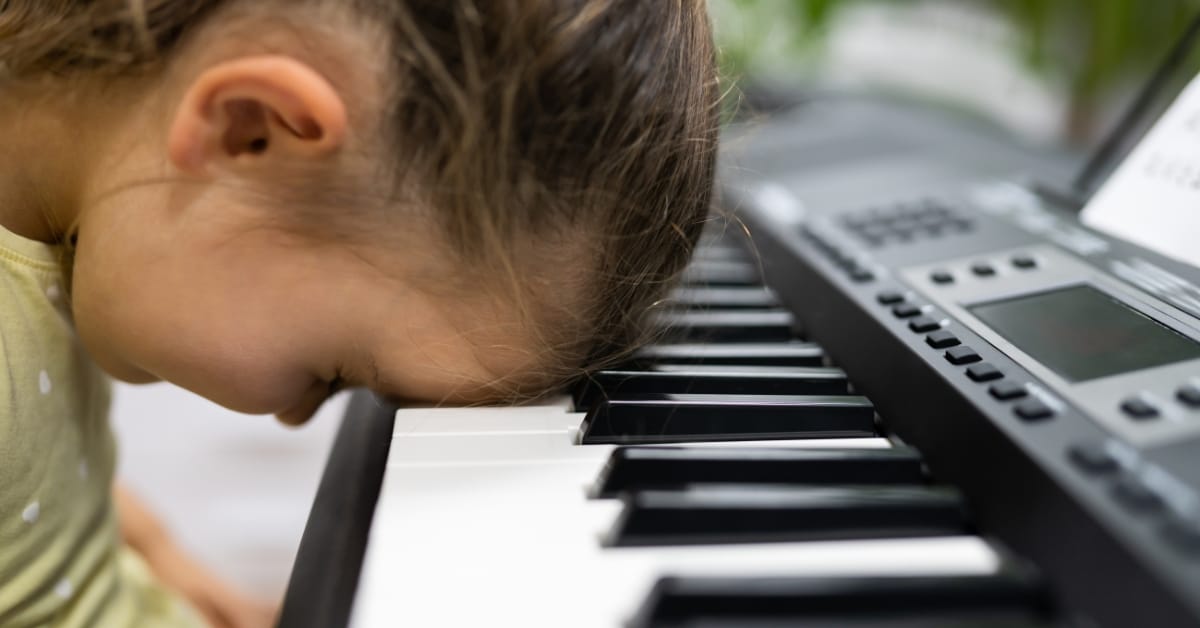
Frustration is normal from time to time. But if you're seeing this in your child regularly, it may be time for a little break.
As a piano parent myself, I know how frustrating it can be when your child wants to quit lessons after you’ve invested in their instrument and musical education. However, even with the best teacher and curriculum, most kids will go through periods of resistance, then will rekindle their interest again down the road.
Here are a few tips:
- Support your child by being actively involved in their practice sessions, looking at their practice logs, talking to the teacher, helping them find engaging music, and providing praise for their hard work.
- Help your child ride out normal ups and downs. Encourage sticking with piano through a few weeks of boredom or disinterest.
- Recognize when an extended break from lessons may be needed for your child’s overall well-being. You want to help them maintain a healthy relationship with music (and a healthy relationship with you, too!)
- Allow quitting if your child has persistently lost passion and happiness playing piano. Forced practice breeds resentment and conflict.
- Remember even elite pianists take breaks and come back refreshed. This is normal and healthy over a lifetime of playing.
- Focus on creating enjoyment around piano and music, not just achievement. Learning an instrument should be a fulfilling journey.
Resources for Returning to the Piano
The great thing about piano is that you can always come back to it! Here are some resources that make returning flexible, fun and self-directed:
- Piano learning games, like SimplyPiano, Yousician and Flowkey, that are like Guitar Hero for Piano. They’re a ton of fun and teach you real music notes, to play real music quickly!
- Streaming lesson sites like Tonebase, Hoffman Academy or Pianote give step-by-step video instruction.
- Sheet music libraries like MuseScore, IMSLP and Sheet Music Direct provide affordable access to massive collections of fun, interesting and engaging music to learn.
We have over 100 of our favorite music learning resources, if you want more.
It’s not like back in the day, where the only way to learn was from the little old lady a few blocks down from you. And if you quit lessons, she would slam the door in your face and you were never allowed to touch a piano ever again!
Nowadays, with the wealth of resources available, you can learn at your own pace and on your own terms. Instead of a binary “taking lessons” or “not”, I encourage you to think of piano participation on a spectrum, of “more active” or “less active.” Your involvement with your piano might fluctuate from day-to-day, month-to-month, year-to-year, but as long as you come back to it every so often, you’re still a piano player, in my book.
How to Quit Piano: The Bottom Line
Quitting piano lessons doesn’t have to be seen as failure or the end of your musical journey. With some self-reflection, planning and an understanding that taking a break can lead to coming back recharged. Quitting can be the right choice during certain seasons of life. If your passion still flickers, there are so many ways to keep music present and balanced with your other priorities.
Have you or your child taken time off from piano? What factors lead to your decision and how did you know it was the right choice? Please share your experiences in the comments!

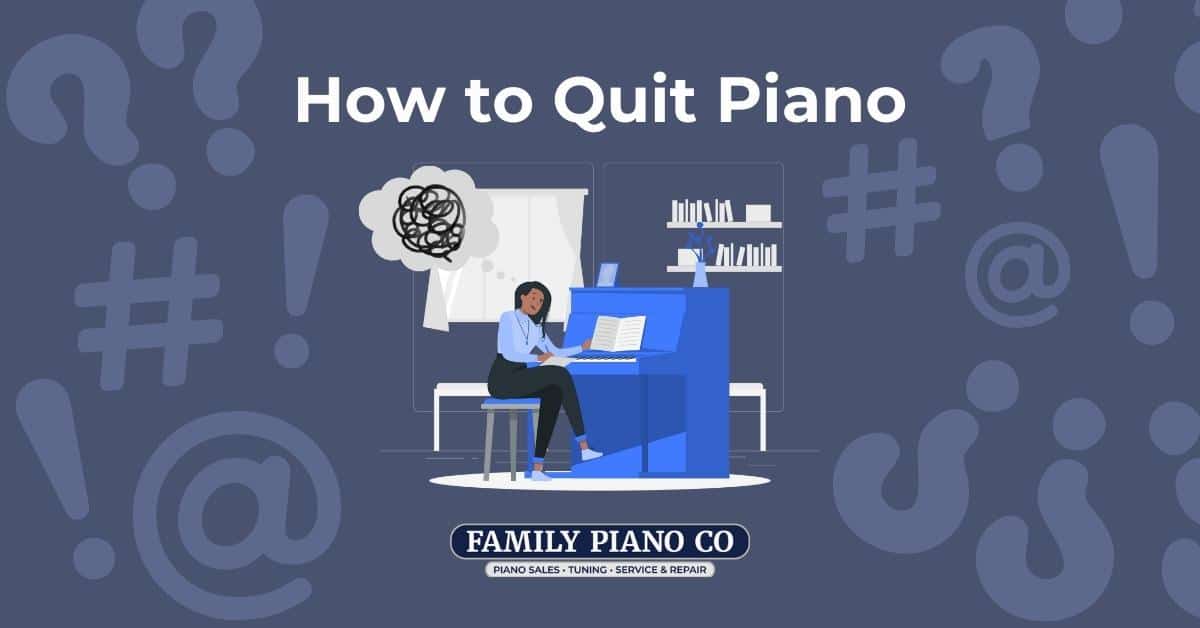
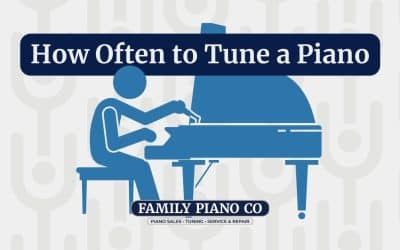
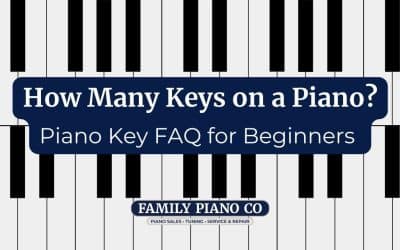

This was an amazing and informative article. I am a much older student who in my late years has been trying to learn to play piano. Since childhood, I have always wanted to play an instrument but life tends to get in the way. My 4 children all took lessons and played in school bands and orchestras until they graduated and went on to higher education and their own busy lives. I started out trying to play acoustic guitar but was not successful due my short fingers. Then 5 years ago I decided to try piano. Had a good teacher and felt like I was making some progress. Participated in a couple of recitals and music fests at my church. My piano teach became very ill and passed away. for a time I considered dropping out but then regained my desire to try learning and playing again. I have some physical issues that hinder my playing but not my desire to be an accomplished pianist. I struggle with some music concepts but have a great, very patient teacher who is helping me overcome some issues.